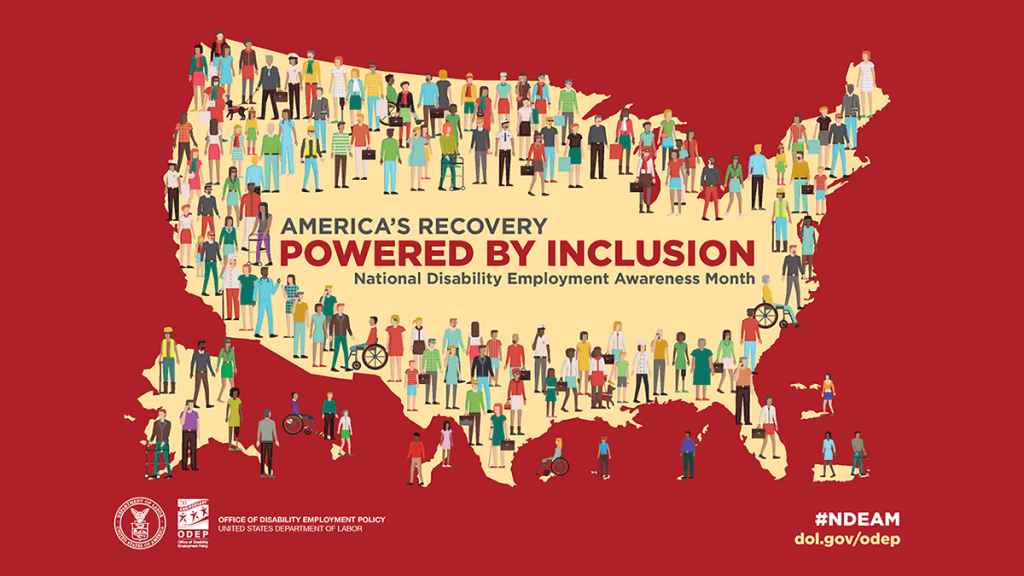Policy & Advocacy Newsline – October 2021

National Disability Employment Awareness Month and Employment Legislation

October is National Disability Employment Awareness Month (NDEAM), as designated by the U.S. Department of Labor’s Office of Disability Employment Policy (ODEP). The goal of NDEAM is to commemorate the many and varied contributions of people with disabilities to American’s workplaces and economy. This year’s theme, “America’s Recovery: Powered by Inclusion,” reflects the importance of ensuring that people with disabilities have full access to employment and community inclusion during our nation’s recovery from the COVID-19 pandemic. More information about NDEAM, along with resources and tools to celebrate it on ODEP’s website.
In October, we celebrate Down syndrome Awareness Month and NDEAM, but our emphasis on employment policy issues is year-round. In accordance with NDSC’s position statement on employment, NDSC is currently focusing our advocacy efforts on the following federal employment-related legislation:
- The Transformation to Competitive Integrated Employment Act (TCIEA) (R. 2373) would address barriers to employment and expand opportunities for CIE for people with disabilities while phasing out subminimum wage certificates under 14(c) of the FLSA over a six-year period. In addition, the TCIEA would provide States, service providers, subminimum wage certificate holders, and other agencies with the resources needed to create CIE service delivery models and the inclusive wraparound services that some individuals with disabilities will need when subminimum wages are phased out.
- The Better Care Better Jobs Act (S. 2210, H.R.4131) (BCBJA) would provide much-needed funding for states to expand access to Home and Community Based Services and address the longstanding direct care workforce crisis by making direct investments in training, recruitment, and retention.
Some elements of both the TCIEA and BCBJA have been included in the budget reconciliation package, which is still being hotly negotiated in Congress. We encourage you to use our Action Alert for tools to help when contacting your members of Congress to advocate for the inclusion of BCBJA in the final reconciliation deal.
Supplemental Security Income Reforms
On September 21, 2021, the U.S. Subcommittee on Social Security, Pensions, and Family Policy of the Senate Finance Committee held the first hearing on Supplemental Security Income (SSI) in decades to discuss policy solutions to strengthen SSI. Nearly 8 million people with disabilities, seniors, and other people with low incomes depend on the SSI program. NDSC submitted written testimony for this hearing which included suggestions to increase the minimum benefit to at least the federal poverty level, increase and inflation-index resource limits, eliminate marriage penalties, eliminate rules about “in-kind support” from friends and family, and update outdated income disregards. The SSI Restoration Act (H.R. 3763/S. 2065) includes many of these proposed reforms, which NDSC supports. Therefore, we are hopeful that at least one of these reforms will be included in the final budget reconciliation deal.
New Federal Guidance on IEP Development and Implementation During COVID-19
On September 30, 2021, in response to requests by stakeholders, including NDSC, the U.S. Office of Special Education and Rehabilitative Services released new guidance on developing and implementing IEPs during COVID-19. This guidance addresses questions on topics including procedures for developing the IEP, the provision of a free appropriate public education (FAPE) in the least restrictive environment, providing a safe environment for students to return to school, and the need for compensatory services (including for students who may have reached the age terminating IDEA services in their state, but who missed critical services).
The National Down Syndrome Advocacy Coalition is Now Over 500 Members Strong!
We are so pleased to have welcomed over 500 NDAC members to our advocacy program bringing together advocates of all abilities and levels of experience from across the country that have a passion for the Down syndrome community.
The National Down Syndrome Advocacy Coalition (NDAC) is a member service of the National Down Syndrome Congress (“NDSC”). NDAC is a grassroots advocacy service designed to educate individuals with Down syndrome, their family members, and other allies about policy issues and give them the advocacy tools and techniques they need to engage with their legislators and advocate for change effectively.
There is no fee to join NDAC, but the benefits are priceless. Members receive the latest policy updates from our experienced NDSC policy team education and are provided the tools and training to engage with lawmakers, agencies, and other key decision-makers to promote policy change. Members are part of a network of advocates working together. Members have access to a quarterly legislative update call, webinars, a closed NDAC member Facebook group, training opportunities, and a meet-up at the annual NDSC Convention. In addition, members are provided timely information on the latest policy topics so they can stay up-to-date on the latest legislative issues.
We are accepting applications for new members and are particularly interested in members from Alaska and Wyoming.
At our last quarterly meeting, we were joined by special guest Connie Garner, former Policy Director for Disability and Special Populations to the U.S. Senate Committee on Health, Education, Labor and Pensions (HELP) and the Director of the Federal Interagency Coordinating Council for Children with Disabilities and as the secretary of education’s principal liaison on interagency health care matters. Connie provided great advice and tips to advocates and we learned of her experiences as she played a key role in:
- the reauthorization of IDEA in 1997 and 2004 and was the key player in adding essential new transition requirements was the chief architect of the CLASS Act on long-term care
- was instrumental in amending the Higher Education Act to allow financial aid for postsecondary students for I.D.
- is a critical player in the legislation of importance to individuals with disabilities in health, education, long-term care, and employment
NDSC is lucky to have Connie service on our bipartisan Public Policy Council.
If you are interested in learning from the best of the best don’t wait any longer – join today!
It is free to join and easy to make a difference
